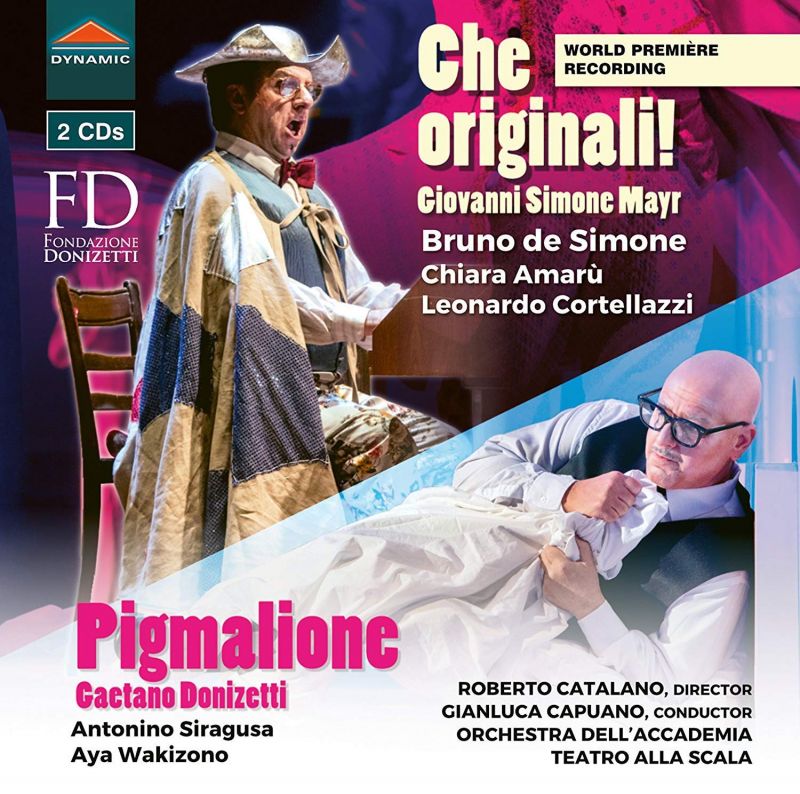MAYR Che originali! DONIZETTI Pigmalione (Capuano)
View record and artist detailsRecord and Artist Details
Composer or Director: Gaetano Donizetti, Giovanni Simone Mayr
Genre:
Opera
Label: Dynamic
Magazine Review Date: 10/2018
Media Format: CD or Download
Media Runtime: 145
Mastering:
DDD
Catalogue Number: CDS7811

Tracks:
| Composition | Artist Credit |
|---|---|
| Che originali! |
Giovanni Simone Mayr, Composer
Angela Nisi, Donna Rosina, Soprano Bruno de Simone, Don Febeo, Baritone Chiara Amaru, Donna Aristea, Mezzo soprano Gianluca Capuano, Conductor Gioia Crepaldi, Celestina, Soprano Giovanni Simone Mayr, Composer Leonardo Cortellazzi, Don Carolino, Tenor Milan La Scala Orchestra Omar Montanari, Biscroma, Baritone Pietro Di Bianco, Carluccio, Bass-baritone |
| Pigmalione |
Gaetano Donizetti, Composer
Antonino Siragusa, Pigmalione, Tenor Aya Wakizono, Galatea, Mezzo soprano Gaetano Donizetti, Composer Gianluca Capuano, Conductor Milan La Scala Orchestra |
Author: Richard Lawrence
Che originali! was later performed under various titles, including La musicomania and Il fanatico per la musica. The story has echoes of Il barbiere di Siviglia – not Rossini’s, which lay far in the future, but, most probably, the setting by Paisiello. Don Febeo, the Doctor Bartolo analogue, is a fussy old father obsessed with music, while Biscroma (‘Demisemiquaver’) is the resourceful servant. There is even a Rosina, but it’s her sister Aristea who is loved by the count, Don Carolino. Febeo rejects Carolino as a prospective son-in-law because he can’t play a single musical instrument. Later, Biscroma presents the disguised Carolino to his master as the new secretary; but Carolino fails his dictation test, which is of music not words, after which he is unmasked and expelled. Finally, Biscroma introduces the Count in another disguise as the distinguished composer Semiminima: Febeo falls for the trick and immediately offers him Aristea’s hand in marriage.
It’s perhaps a little heavy to point out the flaws in the plot: you would expect Carolino to reveal his identity at the end, while Rosina, the hypochondriac other daughter, is virtually written out of the action after her aria. Better to sit back and enjoy the piece as it pokes good-natured fun at the world of opera. When her father queries the style of her get-up, Aristea name-checks the heroines of Metastasio’s librettos, to which she is devoted: Dido, Semiramis, Zenobia … Febeo compares himself to Pergolesi and Jommelli; for his contribution – an accompanied recitative and aria – to a new opera on Don Quixote, Mayr provides him with a parody of opera seria. In general, the music is of its time – like Cimarosa, perhaps, and Mozart, including a quote of Figaro’s ‘Se vuol ballare’ – but the patter duet at the start of the finale looks forward to Rossini and, indeed, Donizetti.
Ilaria Ariemme’s costumes are monochrome for the women, extravagantly polychromatic for the men. The cast is splendidly led by Bruno de Simone, a comedian not unlike Alessandro Corbelli. Chiara Amarù and Angela Nisi are well contrasted as the sisters, both vocally and in character, and Leonardo Cortellazzi makes a game Don Carolino. Add Gioia Crepaldi as the servant Celestina yearning for marriage, and Omar Montanari’s Biscroma on women’s infidelity – more like Mozart’s good-humoured Guglielmo than his Figaro, despite the cuckold’s horns in the orchestra – and you have an opera, and a performance, that will amuse and charm.
Lasting an hour and three quarters, Mayr’s farsa per musica is a long one-acter. Donizetti’s Pigmalione, a scena lirica, clocks up less than 40 minutes. Composed in 1816, it wasn’t performed until 1960. In a sequence of accompanied recitatives and arias the sculptor Pygmalion expresses his despairing love for Galatea, his own creation. She comes to life and they embrace. Antonino Siragusa, in suit and tie, is an unlikely-looking artist but he gives a touching performance. Aya Wakizono has to act in dumb show until she sings at the very end. The music is attractive, with some delicate writing for the woodwind. Gianluca Capuano conducts both operas with spirit. Well worth investigating.
Discover the world's largest classical music catalogue with Presto Music.

Gramophone Digital Club
- Digital Edition
- Digital Archive
- Reviews Database
- Full website access
From £8.75 / month
Subscribe
Gramophone Full Club
- Print Edition
- Digital Edition
- Digital Archive
- Reviews Database
- Full website access
From £11.00 / month
Subscribe
If you are a library, university or other organisation that would be interested in an institutional subscription to Gramophone please click here for further information.




